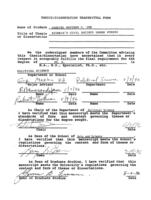- Collection:
- Atlanta University and Clark Atlanta University Theses and Dissertations
- Title:
- Nigeria's civil society under stress, 1996
- Creator:
- Ibe, Gabriel M. C.
- Date of Original:
- 1996-07-01
- Subject:
- Degrees, Academic
Dissertations, Academic - Location:
- United States, Georgia, Fulton County, Atlanta, 33.749, -84.38798
- Medium:
- theses
- Type:
- Text
- Format:
- application/pdf
- Description:
- The major objective of this study is to examine the struggle between the Nigerian civil society and the Nigerian state in the light of the country's 1989-1995 transition to democratic civilian rule. We shall also focus on the factors that hinder these pro-democracy groups from working toward liberal democracy in Nigeria, measure the democratization agenda for Nigeria and predict if the country, in spite of both international and internal pressures, will indeed move toward a genuine democracy. A balance of power between the Nigerian civil society and the Nigerian state, it is argued, will not only lead to accountability, pluralism, and competitive elections, it will also curb fraud and corruption at the governmental level. Hence, civil society in this context, may widely be viewed as an insurance policy against a potential predatory Nigerian state. Both primary and secondary sources were used in this research. It's hypothesis was tested by qualitative techniques of collecting and analyzing a significant body of data relating to the political history of the Nigerian state. Also, this work draws upon twenty-months of field research in Nigeria and relies heavily upon a variety of both published and unpublished materials as well as interviews with over eighty business-persons, trade union activists, government officials, academics and journalists. Our findings reveal that, given the debilitating effects of the International Monetary Fund's (IMF) Structural Adjustment Program (SAP) on basic human needs, ethnicity, clientelism, regional and religious parochialism, the prospects for democratic consolidation are grim. Furthermore, ideal associational groups that are cross-cutting across ethnic/regional and occupational lines by nature, are starkly lacking. This vacuum of a true and democratic civil society is not conducive to an efficient democratic governance in Nigeria. A number of recommendations are made in light of our findings. First, a civil society that is cross-cutting and clientelistic-free and which transcends ethnic or regional dimensions must be established. Political liberalization must be built on a sound indigenous economic base with mutual cooperation between the state and civil society.
- External Identifiers:
- Metadata URL:
- http://hdl.handle.net/20.500.12322/cau.td:1996_ibe_gabriel_mc.pdf
- Rights Holder:
- Clark Atlanta University
- Holding Institution:
- Atlanta University Center Robert W. Woodruff Library
- Rights:
-
